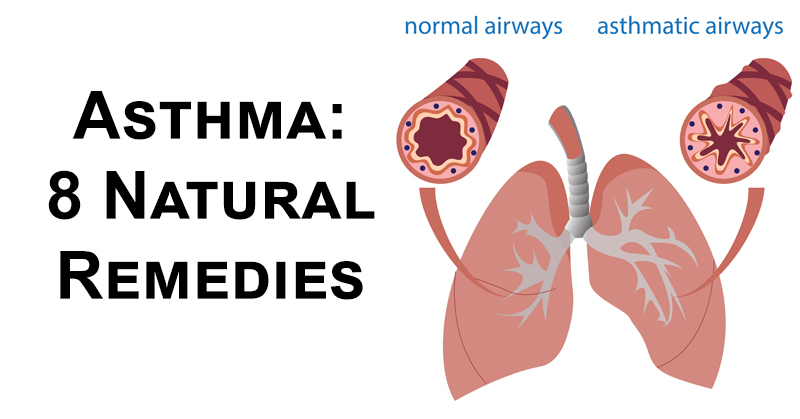For asthma patients, asthma natural remedies might be the best way to go. Although conventional asthma medications can help control symptoms in an emergency, they can actually sometimes make asthma symptoms even worse in the long term. In fact, most asthma medications also have a host of side effects due to how they affect the endocrine system and the immune system. (1)
As such, patients may prefer more natural options. Proper diet and certain prevention methods are just two examples of asthma natural remedies. But in addition to diet and prevention, there are other asthma natural remedies available. If you’re wary of traditional asthma treatments, consider one of the asthma natural remedies listed below.
You might be wondering how to care for asthma without medicine. If so, check out these 8 asthma natural remedies:
1. Best Foods for Treating Asthma

Carotenoid Foods
Do you like oranges? Well, those foods that reflect the reds, oranges, and yellows of the rainbow contain carotenoids. A study of 68,000 women showed that those who ate more tomatoes, carrots, and leafy greens had much lower rates of asthma, and that people prone to asthma tended to have low levels of circulating carotenoids in their blood. And yes, salad leaves tend to be green, but the color under the green chlorophyll are the carotenoids. Think of a leaf turning color in autumn. (2)
Foods with folate (vitamin B9).
Do you want another reason to eat your greens? Dark green leaves are also high in folate – the water-soluble vitamin B9. High-folate foods include green leafy vegetables, beans, nuts and seeds. (3)
Folate reduces allergic reactions and inflammation. Furthermore, it might be capable of reducing wheezing by regulating inflammatory processes. (4)
Vitamin C and vitamin E
Another natural remedy for asthma wheezing, according to some research, is consuming more vitamin C and vitamin E. These vitamins are powerful antioxidants and help detoxify the body. (5, 6)
For vitamin C, consume leafy greens, citrus fruits, cruciferous veggies, and berries. Vitamin E, which is a fat-soluble vitamin, is found in nuts, seeds, and healthy plant oils.
Magnesium
Of the asthma natural remedies, this one applies to many other areas, as well. In fact, magnesium deficiency is common in industrialized areas. Low levels of magnesium are associated with increased risk of developing asthma. (7) It’s been found that magnesium can induce bronchial smooth muscle relaxation and allow air to get into and out of the lungs more easily.
For magnesium, consume greens, nuts, seeds, beans, cocoa, and certain ancient grains.
Cruciferous vegetables
Research shows that a compound in cruciferous veggies, and in fresh broccoli sprouts especially, may help protect against asthma and other respiratory conditions. (8)
Omega-3 foods
Nuts and seeds can also provide a good dose of omega-3s. Omega-3s help lower asthma attacks because they reduce airway inflammation and reactivity of the immune system. (9)
2. Avoid Foods that Can Make Asthma Worse

Hydrogenated fats, sulfites, yellow food dye, and animal products treated with hormones and antibiotics can all trigger or worsen asthma symptoms. Be sure to check labels. (10, 11)
Additionally, hidden food allergies can trigger asthma. Sugar may increase inflammation, as well, making a food-trigger more likely. This includes pasteurized milk products, gluten, soy, eggs, and nuts. (12, 13)
3. Vitamin D

Vitamin D stops lung “remodeling,” the narrowing of breathing passages over time. (14) The daily recommended dose is about 600 IU for adults. That can be obtained through a combination of sun exposure and a healthy diet.
In fact, a study published in the Cochran Database of Systematic Reviews, which tested 435 children and 658 adults with mild to moderate asthma, found that those taking vitamin D supplements experienced fewer severe asthma attacks. Furthermore, subjects required less use of oral steroids for treatment. They also reduced their risk of needing to be hospitalized for acute asthma attacks. (15)
4. Essential Oils

Essential oils just might be one of the best immediate asthma remedies without inhaler usage:
- Peppermint can inhibit allergens, which is a common trigger of asthma. And the methanol can help people with asthma breath better. (16)
- Lavender and eucalyptus may help people with asthma fight inflammation. (17, 18)
- Tea tree oil also reduces inflammation. Furthermore, it can help reduce the body’s allergic response. (19)
- Roman chamomile also has anti-inflammatory properties. It also can help the bronchus relax and it relieves coughing. (20)
5. Other Home Remedies for Asthma
One of the best home remedies for asthma cough at night is to expose yourself to outside air. Try to keep a window open even during the winter to bring fresh air in.
Additionally, consider these tips to avoid asthma-triggering irritants:
- Reduce dust mites by install flooring or carpets that you can vacuum.
- Some medications can worsen asthma symptoms. These include NSAIDs such as aspirin and ibuprofen. Avoid them if you can.
- Wash your bedding frequently, at least once a week. Vacuum upholstery and carpets regularly as well.
- Choose non-allergenic, non-down pillow cases and sheets.
- Avoid pet dander. Clean and brush pets regularly to keep your asthmatic loved one from being exposed to build-up around the home.
- Cockroach droppings are another asthma trigger. Talk to an exterminator if you suspect you might cockroaches in your home. (21)
6. Chiropractic Care
Asthma has been linked to a condition called forward head posture, or FHP. It’s what occurs when your head shifts out in front of your body. As a result, the nerves in the lower part of your neck and upper part of your back become compressed. This compromises lung function. (22)
Seeing a chiropractor can help to correct FHP. Chiropractic adjustments and spinal rehabilitation exercises can help your spine to move back into its ideal alignment. This will take pressure off the nerves that reach out to the lungs.
7. Manage Stress
Stress triggers are everywhere it seems. To help manage asthma, you might try better managing your stress levels.
To help manage stress, the British Guideline on the Management of Asthma recommends Buteyko and pranayama yoga (a type of deep breathing) for asthma management. In fact, seven studies found that these breathing exercises reduce the severity and length of asthma attacks. (23)
8. Exercise and Movement

If you’ve ever searched “how to cure asthma naturally permanently,” you might take a hard look at how much exercise you’re getting. Decreased physical activity is one of the key contributing factors that has caused a rise in asthma. While rigorous activity can sometimes worsen or trigger an asthmatic episode, moderate exercise improves immune function, prevents obesity, and is a great way to manage stress and lower inflammation. (24)
References:
1. Web MD
2. NCBI
3. Harvard – The Nutrition Source
4. NCBI
5. Bio Med
6. UNC Health Talk
7. NCBI
8. PMC
9. PubMed
10. Livestrong
11. Hindawi
12. WebMD
13. Parents
14. NCBI
15. KOIN
16. Academic Journals
17. Science Direct
18. Medical News Today
19. JStage
20. Hindawi
21. AAAAI
22. NCBI
23. ERS – breathe
24. National Library of Medicine


